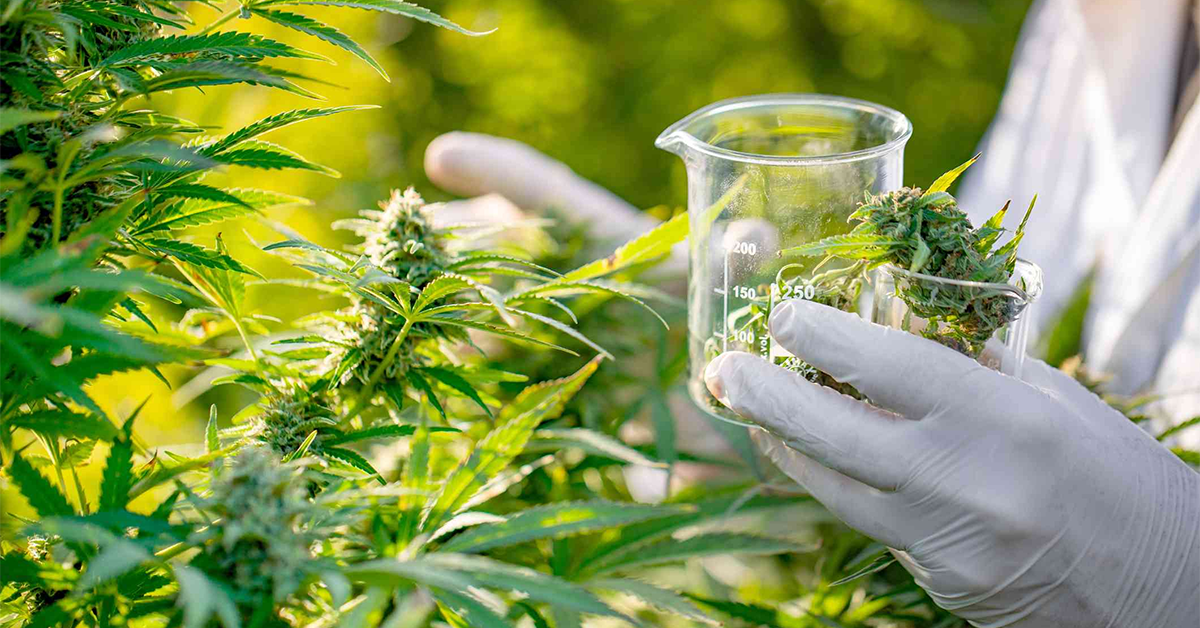Tracing Marijuana's Journey in Michigan Through Science and History

The marijuana plant, renowned for its psychoactive properties, has recently garnered legal status in Michigan. As the acceptance and use of cannabis increase, it prompts a myriad of questions about its origin, biology, and the historical context associated with it.
On the evening of October 10th, Marquette residents and enthusiasts congregated at Blackrocks Brewery. They were there for Northern Michigan University's (NMU) esteemed "Science on Tap" series, a monthly initiative held every second Thursday. Sponsored by the Department of Biology and the Department of Earth, Environmental and Geographical Sciences (EEGS), these sessions present an array of educational insights. In October, Lex Koltowicz, an industrial hygienist with TriMedia Environmental & Engineering Services, stepped in with a comprehensive and intriguing discourse on the history, botany, and intricate biology of cannabis.
Koltowicz's exploration began with hemp's ancient roots. The origins of this versatile plant remain a topic of debate. Nonetheless, historical records depict its journey through Afghanistan, its maritime shipment from Portugal, and its notable utilization across regions like Southeast Asia. He delved further into a genetic examination of the cannabis plant, shedding light on the diverse variants stemming from each geographical area.
Highlighting cannabis as one of humanity's most ancient crops, Koltowicz elucidated its multifaceted anatomy. Beyond its renowned psychoactive traits and oil extraction capabilities, its stems played a pivotal role in creating cords, fabrics, paper, and several other products. This enlightening session sparked a flurry of queries from NMU students.
Witnessing a burgeoning interest in cannabis programs at NMU, more students are veering towards specialized fields like medicinal plant chemistry. For many, "Science on Tap" was not just another event but a chance to deepen their understanding and incorporate newfound knowledge into their academic pursuits. One such student, Cole Edgcombe, in his third year at NMU and enrolled in the cannabis law course, found the session particularly enlightening.
Edgcombe's revelations from the session were twofold. Firstly, he was captivated by the plant's genetics and the ease with which marijuana could be cloned. Secondly, the intricate association between the origins of cannabis and the historical slave trade was an unexpected revelation. He emphasized the cruciality of dispelling misconceptions surrounding marijuana, especially in the academic environment of Michigan. "In this evolving era with pervasive cannabis presence, we must transcend existing stigmas. It's paramount to be well-informed, especially given NMU's extensive programs. It helps in understanding what our peers are delving into," Edgcombe remarked.
The "Science on Tap" series has consistently served as an enlightening platform, with the latest session on marijuana being testament to its success. From contemporary research to intricate debates on cannabis use, anatomy, and proliferation, attendees were privy to a wealth of information. For those eager to continue their academic journey, NMU's "Science on Tap" promises more insightful sessions in the coming months. Details of forthcoming events can be gleaned from NMU's official "Science on Tap" webpage.
Rare Cannabis Syndrome Cases Surge in Michigan Post-Legalization

In the aftermath of marijuana legalization in Michigan, a local hospital has reported a notable surge in cases of a scarcely diagnosed cannabis-related condition, according to a recent study.
The condition, named cannabinoid hyperemesis syndrome (CHS), is primarily seen among long-term cannabis users. CHS manifests with acute symptoms such as intense vomiting, nausea, significant weight loss, and severe abdominal pain. One of the challenges in studying CHS is the absence of a specific International Classification of Diseases, Tenth Revision (ICD-10) code, making its tracking especially intricate. This was shared by Dr. Brittany Tayler, FAAP, the Alice Hamilton Public Health Scholar at Michigan State University-Hurley Children's Hospital, during her presentation at the AAP National Conference & Exhibition.
Working alongside Jenny LaChance, MS, the research director at Hurley Medical Center in Flint, Michigan, Dr. Tayler delved into a comparative analysis of CHS cases among adolescents and young adults, assessing the frequency before and after the state's 2018 marijuana legalization.
Post-legalization, Dr. Tayler noted a more open dialogue from patients about their cannabis consumption. "Following legalization, it became evident that patients weren't receiving the care they deserved. The challenge lies in the perception that since it's cannabis-induced, patients are somehow at fault for their condition," Tayler shared in an interview with Healio.
The research involved a thorough chart review spanning from 2017 to 2022. By searching the electronic medical records for the ICD-10 code R11, linked to "nausea with vomiting, unspecified," and the broader term "cannabis-related disorders", the duo pinpointed 275 CHS cases among patients aged 13 to 26. The data revealed that out of these, only 30 were diagnosed before marijuana legalization, while a staggering 245 were identified post-legalization.
In terms of demographic data, approximately half of each group were identified as African American or Black. Interestingly, the researchers did not uncover any significant variation in documented marijuana use, both pre- (90%) and post-legalization (81.2%). Moreover, the reported alcohol consumption remained relatively consistent, with 37.9% pre-legalization and 28.9% post-legalization. However, a striking discrepancy emerged when it came to tobacco or e-cigarette usage. Before legalization, every participant identified as a smoker, which sharply decreased to 2.4% post-legalization. Dr. Tayler hypothesizes that this could be an indirect indication of their cannabis use prior to legalization, suggesting, "People might have been more transparent about their cannabis use, previously alluding to it through vaping or e-cigarette documentation."
The findings have bolstered the call for ICD-10 to allocate a unique diagnostic code to CHS. Dr. Tayler stressed the importance of shedding light on the potential side effects of cannabis, especially with prolonged and heavy consumption. "The prevailing notion is that marijuana is harmless. However, this isn't the case," Tayler remarked. "With the evolving societal norms placing cannabis alongside alcohol and tobacco, it's crucial that as medical professionals, we stay informed about potential harms and ensure our patients are well-aware too."
How Legal Cannabis is Changing Michigan's Educational Scene

In recent times, the discourse surrounding the legalization of marijuana has gained prominence, particularly as states like Michigan witness burgeoning sales at legal cannabis dispensaries. While advocates of the movement emphasize the robustness of sales controls, concerns persist, especially regarding the accessibility of legally purchased marijuana to the younger generation.
A Shift in Students' Perception
A visit to Hazel Park High School in Michigan painted an interesting picture. Junior Landon Schlack and senior Dayanna Reed, among others, commented on the noticeable shift in students' attitudes towards marijuana. With the emergence of dispensaries at nearly every corner in Michigan, the ease of accessibility is undeniable. Although Schlack and Reed personally abstain, they've observed frequent 'pot parties' amongst their peers.
Driving through Michigan, it's hard to miss the numerous billboards advertising cannabis. For instance, Hazel Park alone boasts of eight active cannabis stores, with a ninth one soon to be operational.
Addressing Cannabis in Educational Institutions
The ripple effect of this growing cannabis culture has penetrated school environments. In a bid to combat this, Hazel Park High School has implemented vaping sensors in bathrooms, designed to detect THC, marijuana's psychoactive component. When activated, these sensors alert security teams, leading to immediate action.
Yet, with the evolving forms of marijuana, detection isn't always straightforward. School Resource Officer Detective Xavier Piper highlighted the challenges, especially with detecting marijuana scent on students who reside in homes where cannabis is used legally.
In terms of incidents, Principal Tammy McHenry reported a rising trend. The school recorded 23 marijuana-related incidents in 2021 and 29 in the following year. In the current year, as of September, there have already been six cases. Projections suggest a potentially significant increase by year-end.
A Mixed Picture Nationwide
While Michigan grapples with these challenges, broader studies from reputable sources such as the National Institutes of Health and the Journal of the American Medical Association present a nuanced view. Some findings indicate either a negligible effect or even a decline in youth marijuana consumption post-legalization.
Considering other states, since Colorado's inaugural retail cannabis store opened approximately a decade ago, the state's Department of Education noticed fluctuating trends in school suspensions linked to marijuana. Concurrently, California's Department of Education has reported a decrease in student cannabis usage since its 2016 legalization.
Local Discipline Measures and Need for More Resources
Back in Michigan, amidst the apparent rise in cannabis usage among students, stringent disciplinary measures are in place. A 10-day suspension awaits Hazel Park students caught using, followed by an intensive review process determining their readmission.
Despite these repercussions, and even after witnessing peers adversely affected by potent cannabis strains, many students persist. This trend underscores the need for more comprehensive educational programs, akin to past initiatives targeting alcohol abuse.
Interestingly, the relationship between Hazel Park Schools and cannabis business proprietors is harmonious. The latter actively contributes to community welfare. Furthermore, a federal grant has recently been secured by Hazel Park, aiming to enhance marijuana-centric educational initiatives for students.
Otsego County Warns Pet Owners Following THC-Induced Dog Attack

In light of a recent harrowing incident, Otsego County Animal Control is emphasizing the importance of securing hazardous substances to ensure pet safety. Last week, a family dog unexpectedly attacked its owner following the ingestion of a THC-infused edible. This incident has sparked a dialogue concerning the potential dangers posed by THC to household pets.
Melissa FitzGerald, the Director of Otsego County Animal Control, recounted the distressing episode where a woman was severely attacked by her family dog after it consumed a THC gummy. The dog, which had been a non-aggressive family member for four years, exhibited uncharacteristic aggressive behavior following the ingestion of THC.
The incident underscores a critical yet often overlooked aspect of pet care—protecting pets from harmful substances. While it's common knowledge among pet owners that certain foods like chocolate can be harmful to dogs, the dangers of THC, a compound found in marijuana and cannabis products, remain relatively unknown to many.
Michigan State University's College of Veterinary Medicine elucidates that THC, the psychoactive compound responsible for the "high" in humans, is actually toxic to animals including dogs, cats, and horses. Unlike CBD, which is deemed safe for dogs, THC can trigger a spectrum of adverse reactions ranging from lethargy and incoordination to restlessness and, as witnessed in Otsego County, aggression.
The incident in Otsego County serves as a stark reminder for pet owners to keep their cannabis products well out of reach from their furry companions. FitzGerald stressed the importance of awareness among pet owners regarding the potential impact of THC on pets, indicating that the effects can vary significantly depending on the individual animal.
"It's crucial to understand the possible reactions and to know what signs to look for," FitzGerald explained. She emphasized the responsibility of pet owners to ensure that harmful substances, especially marijuana and THC products, are securely stored away from pets.
In a proactive measure to prevent similar incidents, FitzGerald revealed that she's collaborating with the Michigan Department of Agriculture and Rural Development (MDARD) and the state veterinarian to advocate for warning labels on THC products, highlighting the risks they pose to pets.
For pet owners who suspect their animal might have ingested THC, immediate contact with a veterinarian is strongly advised. This incident serves as an impetus for both pet owners and the cannabis industry to work together in ensuring the safety of our beloved animals while enjoying the benefits of cannabis responsibly.
MIOSHA Grants to Elevate Workplace Safety

Michigan's cannabis industry and other small businesses with 250 employees or fewer have a golden opportunity. They can now tap into the Michigan Occupational Safety and Health Administration (MIOSHA) grant, which offers up to $5,000 in matching funds. This grant aims to bolster equipment and training, ensuring the safety and health of employees in the cannabis sector and other industries.
Director of the Michigan Department of Labor and Economic Opportunity, Susan Corbin, remarked, "MIOSHA's grant initiatives play an essential role in ensuring safe and healthy workplaces in Michigan. By investing in workplace safety, especially in burgeoning industries like cannabis, we're building a robust and prosperous economy for every Michigander."
The MIOSHA Workplace Improvement to Safety and Health (MIWISH) grant program promises to match every dollar, up to $5,000, which qualifying employers spend on safety and health-enhancing equipment. This aids in fostering safer and healthier work environments, especially in the cannabis sector.
Last year, MIOSHA distributed $250,000 in MIWISH grant funds to 63 Michigan employers, including those in the cannabis industry. A notable recipient was the Howell Area Fire Department, which utilized the grant to buy safety vests, traffic cones, and eye wash stations across its stations.
Brian Anderson, Howell Area Fire Department's Deputy Chief of Operations, shared their experience, "Opting into this grant made sense as it directly benefits our firefighters' health and safety. I urge all, especially those in the cannabis sector, to explore MIOSHA's grant offerings."
It's crucial for Michigan's cannabis business owners to note that while all eligible employers can apply, preference is geared towards those in high-hazard industries, such as cannabis. Applications will be assessed based on the specific risks they address.
MIOSHA Director Bart Pickelman said, "We're here to aid employers, especially in the cannabis industry, in minimizing workplace injuries and illnesses. Through this grant, more businesses can access vital equipment and training, ensuring their employees' safety and health."
To be eligible for the MIWISH grant, businesses, including cannabis enterprises, should:
- Employ 250 or fewer individuals.
- Have a safety professional or committee perform a site-specific evaluation justifying equipment needs.
- Demonstrate capability and dedication to execute the project and match the grant funds.
- Propose actions in the form of equipment or workplace adjustments to mitigate hazards. Examples include noise reduction tools, lock out/tag out systems, and specifically for cannabis growers, climate control systems for cultivation spaces.
As the cannabis industry in Michigan continues to thrive, ensuring the safety and well-being of its employees is paramount. Michigan Green Industry Association Executive Director, Michelle Atkinson, emphasized, "These programs empower small businesses, especially in the cannabis sector, to enhance their safety culture. It's a win-win, with employers ensuring safety without straining their finances."
The grant application period commenced on October 1st, 2023, and will run until the funds are depleted. MIOSHA welcomes new applicants, including those from the cannabis industry.
Businesses that received grants in Fiscal Year 2023 can reapply after January 1st, 2024, provided funds remain.
For a deeper understanding of the MIWISH grant program and application process, prospective cannabis businesses and others can visit michigan.gov/mioshagrants or call MIOSHA's grant administrator at 269-275-7155.
For additional information about MIOSHA and its initiatives to support the cannabis industry and other sectors, please head over to michigan.gov/miosha.
Navigating Youth Safety Amidst Michigan's Marijuana Boom

In recent years, Michigan has experienced a notable economic uplift from the legalization and subsequent sales of recreational marijuana, particularly in major cities like Detroit. With the inception of legal marijuana sales to adults in December 2019, the state has observed billions of dollars in receipts. However, juxtaposed with this economic gain is a concerning trend in youth interaction with the substance.
Statistics from the Detroit Public Schools Community District spotlight an increase in student suspensions related to the possession of drug paraphernalia or controlled substances. Specifically, suspensions have escalated from 289 incidents during the 2019-2021 academic years to 1,735 in the 2021-2023 span, as shared by Assistant Superintendent Alycia Merriweather. This rise is particularly notable, even when considering potential variables like pandemic-related school closures in 2020 and 2021.
The emerging data indicates a necessity to delve deeper into the underlying causes and potential mitigations of increased marijuana use among young people, ensuring that the economic advantages of legalization do not overshadow the well-being of the community's youth.


 Helpful Links
Helpful Links